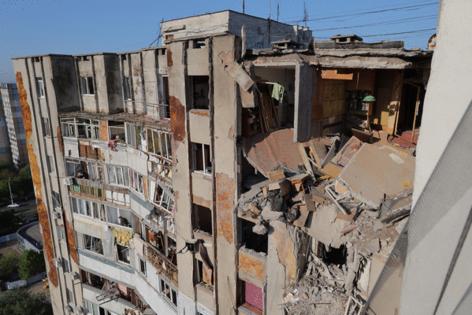Commentary: Trump caved to the Taliban in Afghanistan. Will he repeat in the Russia-Ukraine talks?
Published in Political News
President Donald Trump’s campaign promise to end the war in Ukraine in 24 hours once he was elected has proved to be utter nonsense as experts grade his first 100 days in office. One day, he blames the cause of the war on Ukraine, and then, finally, he criticizes Vladimir Putin after a Russian ballistic missile attack on the Ukrainian city of Sumy killed more than 30 people and wounded more than 80 on Palm Sunday.
Following Trump’s criticism of his favorite Russian, Putin called for a three-day ceasefire in early May, offering a glimmer of hope for progress toward peace talks, but it falls short of a permanent ceasefire and comes from the cunning Russian strongman who has played Trump like a fiddle thus far.
One of Trump’s conditions for supporting Ukraine’s independence and ending the war is to wangle an earth minerals deal out of President Volodymyr Zelenskyy. Trump wouldn’t even agree to Zelenskyy’s request for a security agreement from the U.S. as part of this pact to extract minerals from Ukraine for the U.S.
Here is the transactional president in action, seldom weighing the integrity of a decision, instead focusing on how to take credit for the “art of the deal.” That’s the title of the book he used to convince gullible MAGA and independent voters he was more than the guy whose businesses filed for bankruptcy several times over his checkered career.
Buried in the news and analysis of the 2021 U.S. withdrawal from Afghanistan is the failed strategy of Trump and his negotiators that played right into the Taliban’s hands. He was outfoxed in the negotiations. To cover it up, he simply shifted the blame to President Joe Biden, who does bear significant responsibility for a chaotic and poorly managed evacuation. But before Biden took office in 2021, Trump and his negotiators in peace talks with the Taliban from 2018 to 2020 approved the Doha agreement, the rules of engagement between the U.S. and the Taliban as the U.S. left an unsuccessful 20-year mission in Afghanistan.
Lisa Curtis, formerly a deputy assistant to the president and National Security Council senior director for South and Central Asia during Trump’s first term, penned an insightful essay for the conservative Hoover Institution that assigns blame where Trump never looks. “How the Doha Agreement Guaranteed U.S. Failure in Afghanistan” proves beyond a shadow of a doubt that Trump in 2020 paved the way for the ignominious Afghanistan pullout and the harsh and absolute rule of the Taliban to follow.
According to Curtis, the first mistake of the Trump administration was excluding the Afghan government from the peace talks leading up to the agreement, a mistake Trump repeated as he attempted to sideline Zelenskyy in the peace talks over Ukraine.
The second mistake occurred when the Taliban, with peace talks in progress, car-bombed Bagram Airfield, a U.S. facility at the time, killing at least two Afghans and wounding 80. According to Curtis, this would have been the moment to halt the peace talks so the Taliban would understand how seriously America took attacks on its mission precisely at the time negotiations were underway. Trump did not suspend talks.
To add insult to injury, the Taliban took an American hostage, which should have once again shut down peace talks, but Trump signed Doha a month later — what Curtis calls “the ultimate signal of U.S. weakness and fecklessness.”
The third mistake, Curtis said, was providing the Taliban with everything it wanted without having to concede anything. Trump’s Doha strategy forced the Afghan government to release 5,000 Taliban prisoners who returned to the ranks of the Taliban to mete out more violence in the war-torn nation. One of those released prisoners had killed three Australian soldiers. The Australian prime minister pleaded with Trump not to force the Afghan government to free him. Trump ignored his request.
Trump’s negotiators claimed success in getting the Taliban to agree to break ties with al-Qaida, but Curtis calls it a flimsy pledge with weak and meaningless language. She claims Trump and Biden underestimated the degree to which the Doha agreement had weakened the Afghan state and divided the Afghan political elite. When Biden took office in 2021, Curtis says he could have changed the course of the peace talks but instead chose to stick with the agreement poorly negotiated by Trump.
Biden’s performance is left to historians to judge, but Trump’s incompetence in negotiating with the Taliban presages how he might end Russia’s war against Ukraine. Based on Trump’s failure in Afghanistan, let’s hope he is on the golf course at Mar-A-Lago during the negotiations where the only harm he can do is to a golf ball.
____
Bob Kustra served two terms as Republican lieutenant governor of Illinois and 10 years as a state legislator. He is now host of “Readers Corner” on Boise State Public Radio and a regular columnist for the Idaho Statesman.
_____
©2025 Chicago Tribune. Visit at chicagotribune.com. Distributed by Tribune Content Agency, LLC.




























































Comments